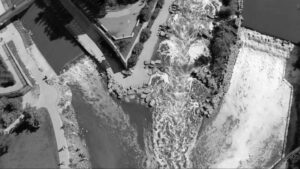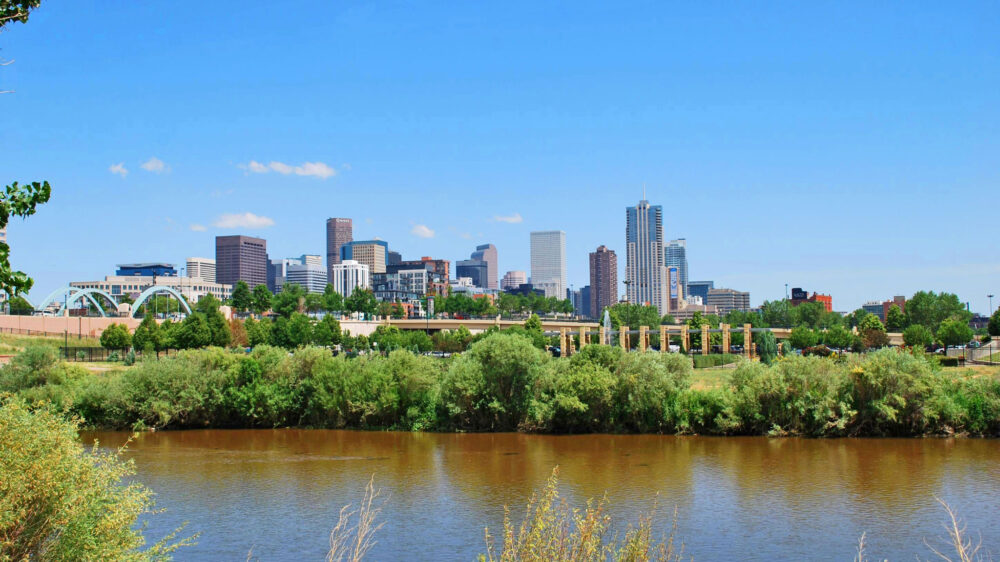The Greenway Foundation reached out to the current 2023 Denver Mayoral Candidates, asking each to respond to three questions concerning the future Denver’s Urban Waterways. As we receive their responses we will continue to update this post with their answers.
It is our hope that those in our community who value the revitalization, preservation, and improvement our rivers, creeks and streams will use these responses to inform their vote in the upcoming mayoral election. Thank you to candidates who have responded to our inquiry, we at TGF look forward to continuing this conversation with you.
Chris Hansen
Denver was recently awarded the single largest appropriation of funding in history for the South Platte River. What would be your commitment to seeing that project through to completion and fulfilling Denver’s non-federal match to the U.S. Army Corps of Engineers funding?
The history of Denver is the history of the South Platte River and as Mayor, I am committed to ensuring this waterway has a cleaner, safer, and more resilient future. As Mayor, I look forward to working with our partners at the Army Corps of Engineers, Mile High Flood District, and the Greenway Foundation that are developing implementation plans for this work currently.
I will make sure the city completes the non-federal match investment in the South Platte River because of the important benefits of doing so that range from reduced flood risks to adjacent neighborhoods and a flourishing ecosystem with improved riparian, wetland, and aquatic habitats to improved neighborhood connectivity and equitable access to a healthy environment for recreational activities.
The South Platte has become such a crucial place for Denverites to have environmental education opportunities. A top priority for my administration is to make Denver more affordable and this work helps nearby homeowners reduce insurance costs, so it is a great fit with my other goals as Mayor. I look forward to supporting the Denver One Water Plan and ultimately, the South Platte River and Tributaries Project as Mayor.
The negative effects of polluted and neglected waterways often have a greater impact on low income neighborhoods and communities of color. How would you address this as Mayor?
Sadly, the negative impacts of industry and transportation have had a strongly disproportionate impact on low income neighborhoods, and as Mayor, I am committed to ensuring we allocate more resources to these communities to prevent further damage to these waterways and neighborhoods and for cleaning up the waterways so families can enjoy these spaces. I have a very strong record on environmental protection from my work in the Colorado state legislature and I am excited to continue that work in Denver as Mayor.
First, I would listen to folks in neighborhoods across the city about what they would like to see happen to make it easier to live near waterways, which might include measures like improved stormwater management and effective snow removal in the winter. Next, I would turn to data to see where we need to act quickly to improve water quality so eventually kids can fish, swim, and play in these waterways. Working with partners inside the government and organizations like the Greenway Foundation, I am confident that we can significantly reduce the disproportionate impacts of pollution on communities in low income areas and communities of color and build a future where our waterways are an asset, not a detriment to communities.
What steps/partners do you see being critical to making those priorities a reality?
As a legislative budget leader at the state level and a systems engineer with extensive private sector experience, this is the type of problem I know I can make meaningful progress on. As Mayor, I will work with partners from Conservation Colorado, including its Protégete initiative, the Mile High Flood District, the Army Corps of Engineers, students from the Colorado School of Mines and other institutions, and additional key advocates and stakeholders to identify the most impactful strategies for addressing environmental justice in neighborhoods that have borne the burden of industry for too long. As Mayor I will make sure the city takes every opportunity to maximize federal funding, which is something that is not happening currently.
Debbie Ortega
Denver was recently awarded the single largest appropriation of funding in history for the South Platte River. What would be your commitment to seeing that project through to completion and fulfilling Denver’s non-federal match to the U.S. Army Corps of Engineers funding?
As Mayor, I will look to our Wastewater Enterprise Fund, Mile High Flood District, and other agency budget contributions to provide matching funds for the priority projects identified in the Army Corp work that has been done along the South Platte River through the city of Denver. These include Weir Gulch, the South Platte River Reach, and Harvard Gulch. I’m aware that the city match is not all expected at once, therefore, I will look to fund these improvements during my time in office.
The negative effects of polluted and neglected waterways often have a greater impact on low income neighborhoods and communities of color. How would you address this as Mayor?
I will move the needle when it comes to promoting and upholding environmental justice by providing increased accountability and metrics for the Climate Protection Fund (CPF), including review of where we can accelerate compliance with the Clean Air Act, to better support our most vulnerable and under-resourced communities and neighborhoods.
This starts with prioritizing the projects (mentioned above) by removing neighborhoods in flood zones that no longer require them to buy flood insurance. This helps with water filtration along the gulches to improve their water flowing into the S. Platte River and tracking progress consistently to see where adjustments in efforts and resources need to be made.
What steps/partners do you see being critical to making those priorities a reality?
As mayor, it is essential to leverage the bully pulpit of the office: I will work to identify foundations and other grants to provide the local match thereby creating a better water future for Denver.
Additionally, I see the Climate Protection Fund and Denver’s Office of Climate Action, DOTI, Mile High Flood District, Parks and Recreation, Platte River Greenway Foundation, and Denver Wastewater being key partners in coordinating with the Army Corp and state and federal resources towards improving the quality and health of our waterways.
Lastly, the continued work, advocacy, and support of organizations like The Greenway Foundation will help make these priorities, and others when it comes to revitalizing our waterways – and I would welcome your continued conversations as mayor.
Kelly Brough
Denver was recently awarded the single largest appropriation of funding in history for the South Platte River. What would be your commitment to seeing that project through to completion and fulfilling Denver’s non-federal match to the U.S. Army Corps of Engineers funding?
The South Platte is an essential component of Denver’s natural habitat and a key feature of our city. It is also a “nationally significant” ecosystem given its location between the Rocky Mountains and the Great Plains and the important role it plays in supporting migrating birds. This historic federal investment in the South Platte was made possible by the once-in-a-generation Infrastructure Investment and Jobs Act and because the money is being allocated all at once, the project can be fast-tracked for faster implementation, delivering climate action and flood mitigation benefits to Denver sooner. For all these reasons, this is the kind of opportunity that I would prioritize for funding and seeing through to completion. To secure the approximately $200 million match I would prioritize funding in the City budget, work with the Denver delegation to the state legislature to unlock state funds and explore innovative public-private partnership (P3) funding opportunities to ensure we provide the non-federal match required.
The negative effects of polluted and neglected waterways often have a greater impact on low income neighborhoods and communities of color. How would you address this as Mayor?
First and foremost, we must invest in those communities most burdened by pollution and climate change. I fully embrace and support the Biden-Harris administration’s Justice 40 Initiative commitment to direct 40 percent of federal investments to communities that “are marginalized, underserved and overburdened by pollution.” We adopted a similar policy in Denver when voters approved the climate tax (question 2A in 2020) which established a goal of investing 50% of the revenue from the climate tax into “communities most vulnerable to climate change.” I will commit to meeting that goal in Denver. Second, it is critical that we establish meaningful processes for on-going community input. My administration will engage with Council members, neighborhoods, and community groups to help us understand what is most important to them and to have them help us make tough decisions about how to prioritize projects and where to allocate scarce resources. Time-limited, front-end only input is not useful. luted and neglected waterways often have a greater impact on low income neighborhoods and communities of color.
What steps/partners do you see being critical to making those priorities a reality?
The Denver One Water Plan, a collaborative plan developed and agreed to by the City of Denver, Denver Water, Mile High Flood District, Colorado Water Conservation Board, Metro Water Recovery and The Greenway Foundation in September 2021, lays the foundation for a shared vision and goals that all the major entities responsible for Denver’s water can align around and work toward. It was developed with input from an advisory group of experts and extensive public engagement. I endorse this collaborative approach and would focus my administration’s efforts on doing the city’s part to advance the recommendations in the plan.
We Welcome More Responses
Candidates or their official representatives are invited to submit responses to Ryan Aids at ryan@greenwayfoundation.org.



